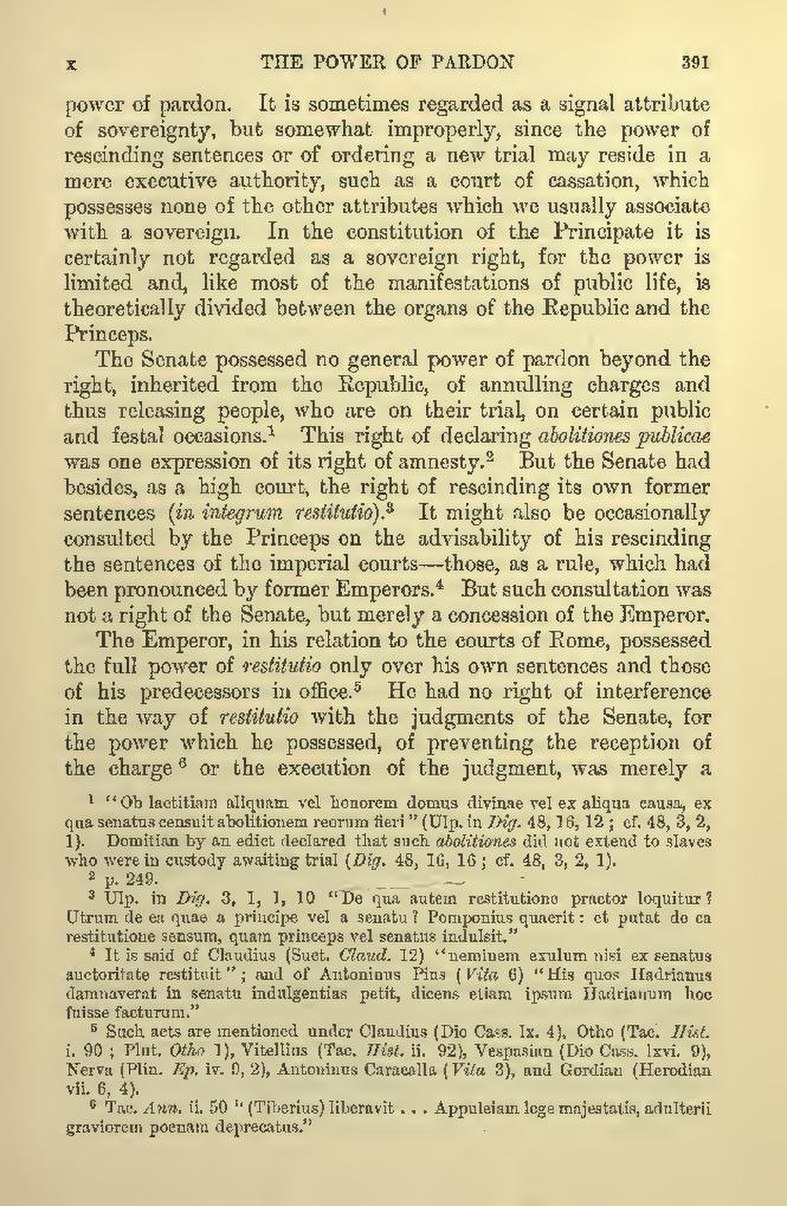power of pardon. It is sometimes regarded as a signal attribute of sovereignty, but somewhat improperly, since the power of rescinding sentences or of ordering a new trial may reside in a mere executive authority, such as a court of cassation, which possesses none of the other attributes which we usually associate with a sovereign. In the constitution of the Principate it is certainly not regarded as a sovereign right, for the power is limited and, like most of the manifestations of public life, is theoretically divided between the organs of the Republic and the Princeps.
The Senate possessed no general power of pardon beyond the right, inherited from the Republic, of annulling charges and thus releasing people, who are on their trial, on certain public and festal occasions.[1] This right of declaring abolitiones publicae was one expression of its right of amnesty.[2] But the Senate had besides, as a high court, the right of rescinding its own former sentences (in integrum restitutio).[3] It might also be occasionally consulted by the Princeps on the advisability of his rescinding the sentences of the imperial courts—those, as a rule, which had been pronounced by former Emperors.[4] But such consultation was not a right of the Senate, but merely a concession of the Emperor.
The Emperor, in his relation to the courts of Rome, possessed the full power of restitutio only over his own sentences and those of his predecessors in office.[5] He had no right of interference in the way of restitutio with the judgments of the Senate, for the power which he possessed, of preventing the reception of the charge[6] or the execution of the judgment, was merely a
- ↑ "Ob laetitiam aliquam vel honorem domus divinae vel ex aliqua causa, ex qua senatus censuit abolitionem reorum fieri" (Ulp. in Dig. 48, 16, 12; cf. 48, 3, 2, 1). Domitian by an edict declared that such abolitiones did not extend to slaves who were in custody awaiting trial (Dig. 48, 16, 16; cf. 48, 3, 2, 1).
- ↑ p. 249.
- ↑ Ulp. in Dig. 3, 1, 1, 10 "De qua autem restitutione praetor loquitur? Utrum de ea quae a principe vel a senatu? Pomponius quaerit: et putat de ea restitutione sensum, quam princeps vel senatus indulsit."
- ↑ It is said of Claudius (Suet. Claud. 12) "neminem exulum nisi ex senatus auctoritate restituit"; and of Antoninus Pius (Vita 6) "His quos Hadrianus damnaverat in senatu indulgentias petit, dicens etiam ipsum Hadrianum hoc fuisse facturum."
- ↑ Such acts are mentioned under Claudius (Dio Cass. lx. 4), Otho (Tac. Hist. i. 90; Plut. Otho 1), Vitellius (Tac. Hist. ii. 92), Vespasian (Dio Cass. lxvi. 9), Nerva (Plin. Ep. iv. 9, 2), Antoninus Caracalla (Vita 3), and Gordian (Herodian vii. 6, 4).
- ↑ Tac. Ann. ii. 50 "(Tiberius) liberavit . . . Appuleiam lege majestatis, adulterii graviorem poenam deprecatus."
